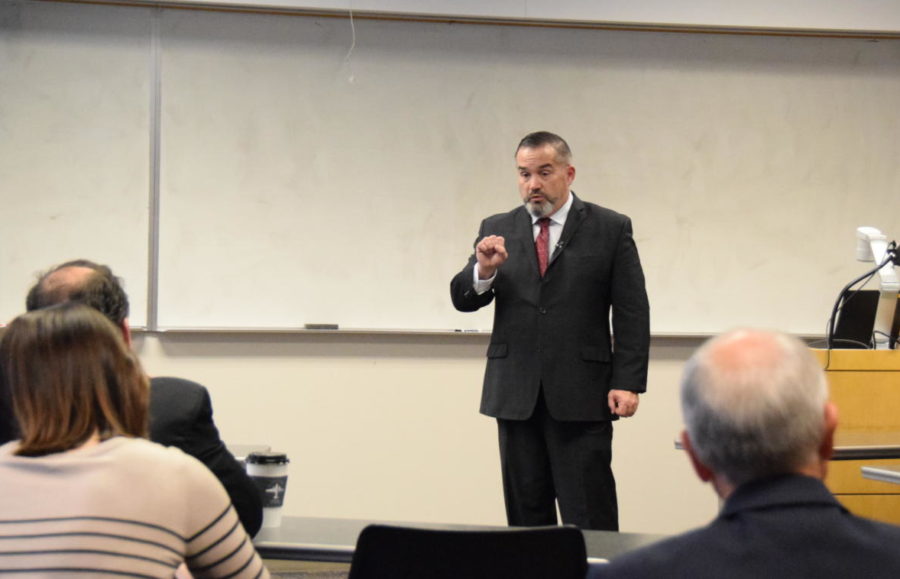Iowa State sees final extension and outreach open forum
Gregg Hadley pictured during his presenation at the final Extension and Outreach Candidate Forum.
Iowa State held the final open forum in its search for a new vice president for Extension and Outreach, hearing a presentation from Gregg Hadley, the current Director of Extension at Kansas State University.
Hadley was introduced by the Dean of the College of Human Sciences, Laura Jolly. Jolly said Hadley earned his bachelor’s degree from Purdue University and his doctorate and master’s degrees from Michigan State University, all of which were in agriculture economics.
Hadley said that although his leadership style typically has to do with following the general consensus, there are times when a more authoritarian leadership style is needed to accomplish tasks.
“So, you want to reach out and branch out and bring the style of leadership that is needed for that particular issue,” Hadley said. “And so, while 85% of the time, you will hear me talking about being inclusive, getting feedback and everything, there are times when you have to adjust your style.”
Hadley said it is important to think from the perspective of constituents and learners. He said extension is about meeting people where they are, delivering the information they need, when they need it and how they need it.
Hadley said that leadership roles are not limited to the people at the top of an organization; rather, every individual involved in a community is a leader in some shape or form.
“No matter what you’re doing in a community, you’re a leader,” Hadley said. “And so as part of professional development in extension, we have to make sure that all of our extension people have as much leadership training as possible.”
Hadley also spoke on the significance of extension and outreach within the land-grant mission. Hadley broke it down into three acts that dictated the existence of land-grant universities. The Morrill Act allowed for the creation of land-grant universities, the Hatch Act gave land-grant universities resources to pursue their own agricultural research, and the Smith-Lever Act saw the creation of extension services connected to land-grant universities.
“So, the role of extension and outreach in the land grant mission, it took a while to develop, but it’s deeply rooted in the land grant mission,” Hadley said. “In fact, it was the third missing piece in the development of our society. And so it’s incredibly important.”
Hadley said that the three aspects of the land-grant mission are often treated as three separate silos that occasionally work together. Although education, research and extension can all be valuable on their own, people see the most benefit when they function cohesively together.
“It really gets back to this old concept that the research is for the local benefit and the state benefit, the teaching is for the state benefit, and then the extension is for that,” Hadley said. “All these working together, and simultaneously, not in necessarily the university pushing information out, but information coming back to the university.”
Hadley said that when a university has a strong extension program in a community, it is likely to cultivate students who will come to the university and stakeholders who are willing to work with the university on research.
“There’s lots of things that we need to work on at extension, but the one thing is, we have to do it together,” Hadley said. “We have to take the teaching mission, the research mission, the extension mission and kind of work more holistically as we approach the issues that are affecting our state and our local communities.”
After Hadley’s presentation, the forum opened up to questions from the audience. One member of the online audience asked how Hadley would engage with state legislators and express the value of extension and outreach.
Hadley said that as Director of Extension at Kansas State, he would have annual meetings with sets of key legislators and have conversations about how to empower extension and how extension addresses critical issues.
“And one of the things that really sold the legislature on this is we do a lot of critical issues facilitation,” Hadley said. “And two of these legislators, one Democrat, one Republican, knew that the next session was going to be trying and just asked us, ‘could you put on a session, just talking about civil discourse, and how to have discussions.’”
Hadley said when legislators saw what the session did for attendees learning to discuss controversial issues, it led to the rest of the legislators having greater respect for extension.
Another member of the audience pointed out the similarities between economics and history and asked how Hadley’s background in economics shows that he is the right person for the job.
Hadley said history is very important, providing opportunities to learn from decisions and actions people have already taken. Hadley also said an aspect of being an economist is looking to the future for opportunities and potential bumps in the road.
“So, I would say my economics background has prepared me for this very well with just those two perspectives,” Hadley said. “And also, being an economist, I’m used to working with big numbers, in the budget perspective, it’s kind of easy. But yeah, economics can be both future looking and historical.”
Your donation will support the student journalists of the Iowa State Daily. Your contribution will allow us to purchase equipment, send our student journalists to conferences and off-set their cost of living so they can continue to do best-in-the-nation work at the Iowa State Daily.














